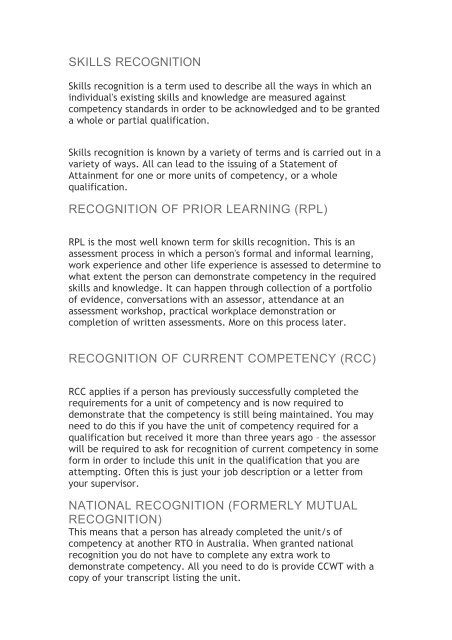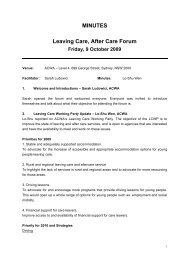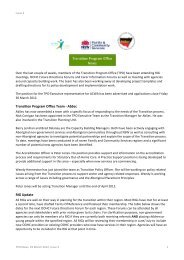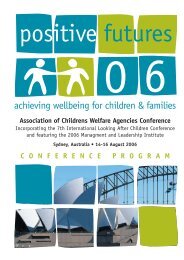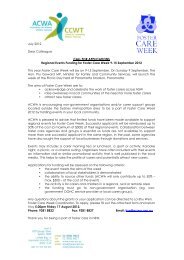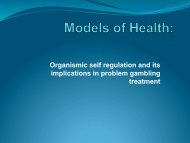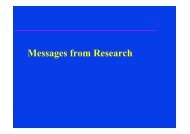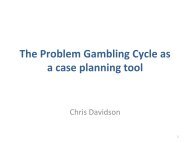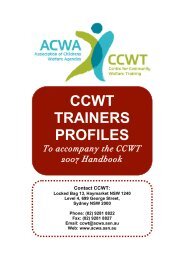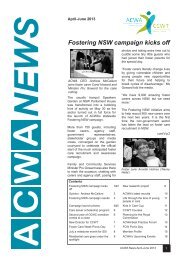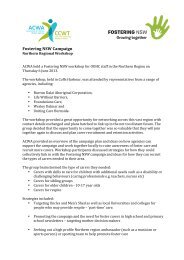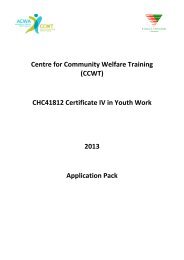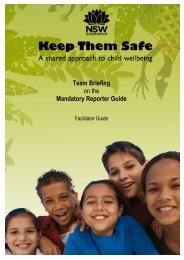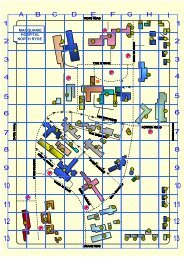Recognition of prior learning process
Recognition of prior learning process
Recognition of prior learning process
Create successful ePaper yourself
Turn your PDF publications into a flip-book with our unique Google optimized e-Paper software.
SKILLS RECOGNITION<br />
Skills recognition is a term used to describe all the ways in which an<br />
individual's existing skills and knowledge are measured against<br />
competency standards in order to be acknowledged and to be granted<br />
a whole or partial qualification.<br />
Skills recognition is known by a variety <strong>of</strong> terms and is carried out in a<br />
variety <strong>of</strong> ways. All can lead to the issuing <strong>of</strong> a Statement <strong>of</strong><br />
Attainment for one or more units <strong>of</strong> competency, or a whole<br />
qualification.<br />
RECOGNITION OF PRIOR LEARNING (RPL)<br />
RPL is the most well known term for skills recognition. This is an<br />
assessment <strong>process</strong> in which a person's formal and informal <strong>learning</strong>,<br />
work experience and other life experience is assessed to determine to<br />
what extent the person can demonstrate competency in the required<br />
skills and knowledge. It can happen through collection <strong>of</strong> a portfolio<br />
<strong>of</strong> evidence, conversations with an assessor, attendance at an<br />
assessment workshop, practical workplace demonstration or<br />
completion <strong>of</strong> written assessments. More on this <strong>process</strong> later.<br />
RECOGNITION OF CURRENT COMPETENCY (RCC)<br />
RCC applies if a person has previously successfully completed the<br />
requirements for a unit <strong>of</strong> competency and is now required to<br />
demonstrate that the competency is still being maintained. You may<br />
need to do this if you have the unit <strong>of</strong> competency required for a<br />
qualification but received it more than three years ago – the assessor<br />
will be required to ask for recognition <strong>of</strong> current competency in some<br />
form in order to include this unit in the qualification that you are<br />
attempting. Often this is just your job description or a letter from<br />
your supervisor.<br />
NATIONAL RECOGNITION (FORMERLY MUTUAL<br />
RECOGNITION)<br />
This means that a person has already completed the unit/s <strong>of</strong><br />
competency at another RTO in Australia. When granted national<br />
recognition you do not have to complete any extra work to<br />
demonstrate competency. All you need to do is provide CCWT with a<br />
copy <strong>of</strong> your transcript listing the unit.
CREDIT TRANSFER<br />
Credit transfer involves assessing a previously completed course or<br />
subject to see if it provides equivalent competency outcomes to those<br />
required by the person's course <strong>of</strong> study.<br />
MORE ON RPL<br />
<strong>Recognition</strong> <strong>of</strong> Prior Learning has earned a reputation as a complex<br />
and time consuming way <strong>of</strong> completing a qualification. In the past it<br />
has involved the collection <strong>of</strong> reams <strong>of</strong> paper based evidence to prove<br />
your competency. Sometimes it was easier and less time consuming to<br />
attend the workshop and complete the written assessment than<br />
bother with RPL.<br />
Not any more! RPL has changed significantly in the last three years<br />
and is now a time and cost effective way <strong>of</strong> completing a partial or<br />
whole qualification.<br />
RPL<br />
WORKSHOPS<br />
ACWA/CCWT <strong>of</strong>fers RPL workshops for the qualifications CHC52208<br />
Diploma <strong>of</strong> Community Services Coordination and BSB51107 Diploma <strong>of</strong><br />
Management and for a cluster <strong>of</strong> four units in Case Management. At<br />
these workshops you demonstrate that you have the necessary skills<br />
and qualifications to be granted the relevant units <strong>of</strong> competency.<br />
You may take part in role plays, group discussions, written<br />
assessments and conversations with the assessor. Sometimes there is<br />
work that is required to be completed outside <strong>of</strong> the workshop, but<br />
this is kept to a minimum. You are provided with all the resources<br />
that you need to prepare for the workshop and complete the<br />
qualification or cluster <strong>of</strong> units.<br />
RPL<br />
PORTFOLIO<br />
Some people prefer the traditional method <strong>of</strong> collecting workplace<br />
evidence, so this <strong>process</strong> has been streamlined and improved. You are<br />
provided with Evidence Guides, which give you some idea <strong>of</strong> the types<br />
<strong>of</strong> evidence that you could collect. After an initial evidence collection<br />
period you then engage in a 'pr<strong>of</strong>essional conversation' with your<br />
assessor in which you discuss your work practices. This means that you<br />
don't have to have paper based evidence for all parts <strong>of</strong> the<br />
qualification, which is particularly useful for people who have moved<br />
jobs or do not have paper evidence <strong>of</strong> every task and <strong>process</strong> that<br />
they carry out in the workplace.<br />
Including the pr<strong>of</strong>essional conversation in this <strong>process</strong> has significantly
shortened the evidence collection <strong>process</strong> and has enabled a more<br />
flexible approach to demonstration <strong>of</strong> competency. In many cases the<br />
pr<strong>of</strong>essional conversation takes place in your workplace and your<br />
evidence is right there at your fingertips.<br />
After the pr<strong>of</strong>essional conversation you complete your RPL <strong>process</strong> by<br />
finding evidence to fill the gaps.<br />
WHAT ARE THE ADVANTAGES OF SKILLS<br />
RECOGNITION<br />
◦ You don't have to sit through training courses or assessment tasks<br />
that you have already done before<br />
◦ It is normally cheaper than attending training and assessment<br />
◦ You can therefore spend your training budget and time on different<br />
training<br />
◦ You can start at any time without having to wait for the training<br />
course to be scheduled.<br />
WILL I LEARN ANYTHING DOING SKILLS<br />
RECOGNITION<br />
When you are taking part in an RPL <strong>process</strong> you come to a greater<br />
understanding <strong>of</strong> the range <strong>of</strong> skills and knowledge that you possess,<br />
and, particularly if you attend an RPL workshop, there are some<br />
elements <strong>of</strong> <strong>learning</strong> in the <strong>process</strong>. In gathering evidence you <strong>of</strong>ten<br />
learn to look at your work in new ways and can be challenged to try<br />
new ideas.<br />
However the <strong>learning</strong> <strong>process</strong> is much more obvious if you attend a<br />
training workshop and then complete the assessment. In a workshop<br />
you are faced with new theories and practices and learn from the<br />
other participants. If you wish to be exposed to a range <strong>of</strong> new<br />
<strong>learning</strong>, you can attend the training workshop and then complete<br />
your assessment requirement by RPL if you wish.


